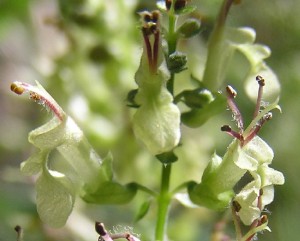Teucrium scorodonia, common name the woodland germander or wood sage, is a perennial herb belonging to the genus Teucrium of the Lamiaceae family. It is native to Western Europe and Tunisia, cultivated in many places as an ornamental plant in gardens, and naturalized in several regions (New Zealand, Azores, and a few locales in North America).
Contents
Uses
The herb is alterative, astringent, carminative, diaphoretic, diuretic, emmenagogue, tonic and vulnerary. It is harvested in July and can be dried for later use. The herb is often used in domestic herbal practice in the treatment of skin afflictions, diseases of the blood, fevers, colds etc. It is an appetizer of the first order and is equal to gentian root as a tonic.
Benefits
People take wood sage for digestive tract disorders, tuberculosis, swollen airways, throat spasms, high blood pressure, wounds, and liver disorders.
Cautions
There isn’t enough information to know if wood sage is safe or what the possible side effects might be.
Special Precautions & Warnings:
Pregnancy and breast-feeding: Not enough is known about the use of wood sage during pregnancy and breast-feeding. Stay on the safe side and avoid use.
Interactions
None are recorded.
Other names
Wood Sage, Altamisa Real, Ambroise, Baume Sauvage, Escorodonia, Fausse Menthe, Faux Scordion, Faux Scordium, Garlic Sage, Germandrée des Bois, Germandrée Scorodoine, Germandrina de Bosque, Hind Heal, Large-Leaved Germander, Sauge des Bois, Sauge des Montagnes, Sauge Sauvage
References
Source: Wikipedia, https://en.wikipedia.org/wiki/Teucrium_scorodonia

